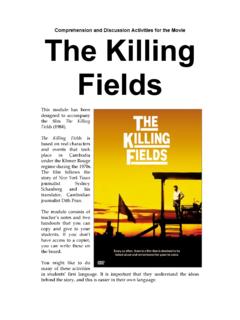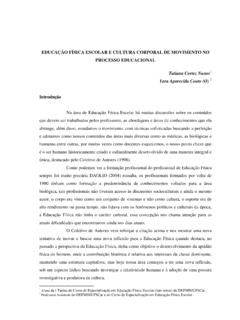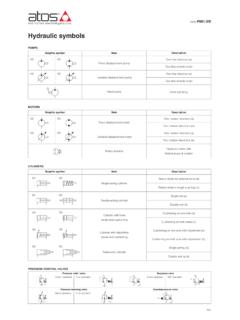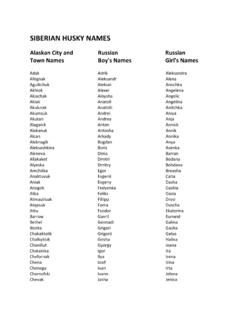Transcription of Comprehension and Discussion Activities for the …
1 Comprehension and Discussion Activities for the Movie Hotel Rwanda This module has been designed to accompany the film Hotel Rwanda (2004). Hotel Rwanda is based on real characters and events that took place in Rwanda in 1994. Tension between Hutu and Tutsi ethnic groups reached a crisis point in that year, when Rwandan radio announced that May 5 was to be the cleanup day . On that day the capital, Kigali, must be cleansed of Tutsis. Nearly one million people were killed by Hutu militia shortly after this announcement.
2 Hotel Rwanda is a film about this event. Hotel Rwanda is also about Paul Rusesabagina, who made the hotel he managed into a refugee camp. This single daring act allowed thousands to survive. The module consists of teacher s notes and two handouts that you can copy and give to your students. If you don t have access to a copier, you can write these on the board. You might like to do many of these Activities in students first language.
3 It is important that they understand the ideas behind the story, and this is easier in their own language. Teacher s Notes 1. Before You Watch : Rwanda Ask students what they know about Rwanda. Write their ideas on the board. : Background Give copies of Worksheet 1: Background Information to your students, or explain this information to them. Here are some exercises you can do with the worksheet if you like. Write them on the board while students are reading the worksheet. Exercise A: Draw a timeline of the history of Rwanda, starting with the first Tutsi king.
4 Exercise B: True or false? If false, write a correct sentence. 1. The Tutsi ruled over the Hutu for more than 100 years. 2. There are more Hutus than Tutsis in Rwanda. 3. Belgium was given control of Rwanda after World War II. 4. Identity cards made it easier to know whether someone was Hutu or Tutsi. 5. The Belgians treated the Hutu and the Tutsi the same. 6. Fighting between the Hutu and the Tutsi began after Rwanda was given independence from Belgium in 1962. Answers to Exercise A: Exercise B: 1.
5 T 2. T 3. F They were given control over Rwanda after World War One. 4. T 5. F They used the Hutu as forced labour, and the Tutsi as supervisors. 6. F They overthrew the Tutsi king three years before independence. : Useful Vocabulary Here are some useful words and phrases to help students understand the movie. Write these on the board and get students to look them up in their dictionaries, or explain the meanings. peacekeeper convoy militia rebel ethnic tensions genocide rules of engagement massacre favour (v) favour (n) evacuation machete visa peace agreement cockroach intervene 1860 Tutsi King 1990 Civil war starts 1962 Independence from Belgium 1933 Ethnic identity cards issued 1924 Belgian colonisation begins 1959 Hutus defeat ruling Tutsi king 1994 Genocide begins Teacher s Notes 2.
6 While You Watch : Hutu and Tutsi Give copies of Worksheet 2: While You Watch to your students, or write the questions for on the board. Play the film to Answers to Exercise A: 1. 1994, Kigali 2. manager, Milles Collines 3. Colonel Oliver 4. George Rutaganda, Paul, radio announcer, Hutu Power Radio 5. business, fools, powerful 6. Interhamwe, Hutu 7. Rwandan Armed Forces Exercise B: 1 a. Cigars to George Rutaganda, and whisky to General Bizimungu b. Students discuss whether only family matters in crises.
7 Should we give equal priority to helping friends, neighbours and strangers, or do we have a duty to look after our relatives first? 2 a and b. There are no right or wrong answers. Break into small groups to discuss these questions and then come back together and discuss as a class. c. Many historians say the British treated ethnic and religious groups differently in India, Sudan and Nigeria. There are more examples. : The President is Killed Play the film to If students don t have Worksheet 2, write the exercises on the board before you play the film.
8 Answers to Exercise A: Tatiana s sister and brother-in-law visit Paul at the Milles Collines. Because of the danger, they want to leave Rwanda and take Tatiana and the children with them. They feel Paul is in no danger because he is a Hutu, while they, Tatiana, and the children are Tutsi. Paul says there is no danger as the United Nations and the world press are watching. Later, Paul is driving home and hears gunfire, shouting, and glass breaking. Buildings are burning. When he arrives, his family and neighbours are hiding in the dark.
9 There are no lights on. They say there is a rumour that President Habyarimana has been murdered, and Tutsi rebels have killed him. He says this is nonsense . Exercise B: 1 a. The announcer on Hutu Power Radio (George Rutaganda, the Hutu businessman and Interhamwe militia leader). b. The Interhamwe militia. c. We cannot know for sure. Some extra information you can give your students: Responsibility for the death has never been confirmed, but the speed with which the genocide was launched strongly suggests planning.
10 Within 24 hours of the president s assassination, the Interhamwe set up road blocks around Kigali. Tutsis were immediately separated from Hutus and hacked to death with machetes. At the same time, death squads worked from prepared lists and went from neighbourhood to neighbourhood in Kigali finding victims. They murdered not only Tutsis but moderate Hutus. 2 a. American President Bill Clinton b. The American public listening to the radio, in the US and Rwanda.

















